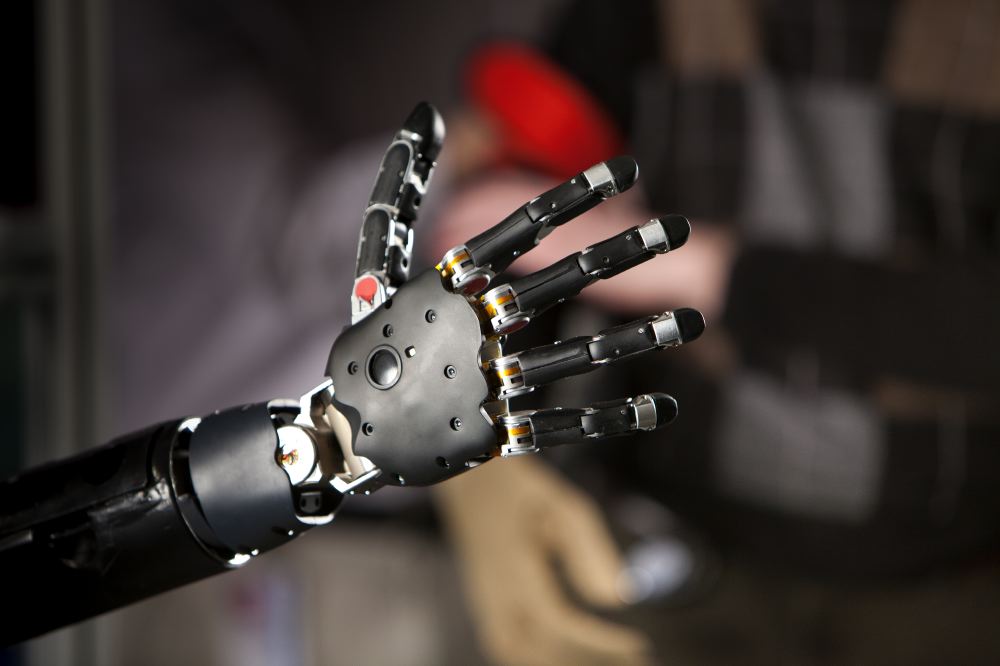A Georgia Tech College of Design professor named Gil Weinberg has made headlines recently for creating a prosthetic arm where all five individual fingers can move independently of each other. The mechanical digits are so dexterous, in fact, that they allow the person using them to actually play the piano. This could lead to some explosive developments in the robotics prosthesis sector.
The advanced prosthetics were developed for Jason Barnes who suffered a major electric shock back in 2012, resulting in doctors having to remove parts of his arm from the elbow down, Futurism reports. As a musician, Barnes was understandably devastated by this loss but Weinberg gave him hope. Two years after the incident, Barnes was given a prosthetic arm that actually allowed him to play the drums.
At the time, however, what the patient really wanted was to be able to play the piano again. So the engineers got to work and now, Barnes got his wish. He is now equipped with a prosthetic arm with fingers nimble enough to be moved individually.
With regards to how the scientists even managed to do this, Weinberg explained in a post on the Georgia Tech publication that it was due to ultrasound. The key is to basically intercept the intent from the patient and then interpret that to produce the corresponding movement.
“Our prosthetic arm is powered by ultrasound signals,” Weinberg said. “By using this new technology, the arm can detect which fingers an amputee wants to move, even if they don’t have fingers.”
For his part, Barnes is simply ecstatic that he is now much closer to regaining his former level of movement. The technology isn’t perfect, but it is the ray of hope that amputees can hold on to.
“It’s completely mind-blowing,” Barnes said. “This new arm allows me to do whatever grip I want, on the fly, without changing modes or pressing a button. I never thought we’d be able to do this.”



 SpaceX Seeks FCC Approval for Massive Solar-Powered Satellite Network to Support AI Data Centers
SpaceX Seeks FCC Approval for Massive Solar-Powered Satellite Network to Support AI Data Centers  Baidu Approves $5 Billion Share Buyback and Plans First-Ever Dividend in 2026
Baidu Approves $5 Billion Share Buyback and Plans First-Ever Dividend in 2026  Nvidia, ByteDance, and the U.S.-China AI Chip Standoff Over H200 Exports
Nvidia, ByteDance, and the U.S.-China AI Chip Standoff Over H200 Exports  Sony Q3 Profit Jumps on Gaming and Image Sensors, Full-Year Outlook Raised
Sony Q3 Profit Jumps on Gaming and Image Sensors, Full-Year Outlook Raised  Nintendo Shares Slide After Earnings Miss Raises Switch 2 Margin Concerns
Nintendo Shares Slide After Earnings Miss Raises Switch 2 Margin Concerns  Alphabet’s Massive AI Spending Surge Signals Confidence in Google’s Growth Engine
Alphabet’s Massive AI Spending Surge Signals Confidence in Google’s Growth Engine  SpaceX Prioritizes Moon Mission Before Mars as Starship Development Accelerates
SpaceX Prioritizes Moon Mission Before Mars as Starship Development Accelerates  Nvidia Nears $20 Billion OpenAI Investment as AI Funding Race Intensifies
Nvidia Nears $20 Billion OpenAI Investment as AI Funding Race Intensifies  Elon Musk’s SpaceX Acquires xAI in Historic Deal Uniting Space and Artificial Intelligence
Elon Musk’s SpaceX Acquires xAI in Historic Deal Uniting Space and Artificial Intelligence  SoftBank Shares Slide After Arm Earnings Miss Fuels Tech Stock Sell-Off
SoftBank Shares Slide After Arm Earnings Miss Fuels Tech Stock Sell-Off  SpaceX Updates Starlink Privacy Policy to Allow AI Training as xAI Merger Talks and IPO Loom
SpaceX Updates Starlink Privacy Policy to Allow AI Training as xAI Merger Talks and IPO Loom  Sam Altman Reaffirms OpenAI’s Long-Term Commitment to NVIDIA Amid Chip Report
Sam Altman Reaffirms OpenAI’s Long-Term Commitment to NVIDIA Amid Chip Report  Nvidia Confirms Major OpenAI Investment Amid AI Funding Race
Nvidia Confirms Major OpenAI Investment Amid AI Funding Race  TSMC Eyes 3nm Chip Production in Japan with $17 Billion Kumamoto Investment
TSMC Eyes 3nm Chip Production in Japan with $17 Billion Kumamoto Investment  Palantir Stock Jumps After Strong Q4 Earnings Beat and Upbeat 2026 Revenue Forecast
Palantir Stock Jumps After Strong Q4 Earnings Beat and Upbeat 2026 Revenue Forecast  Tencent Shares Slide After WeChat Restricts YuanBao AI Promotional Links
Tencent Shares Slide After WeChat Restricts YuanBao AI Promotional Links 





























